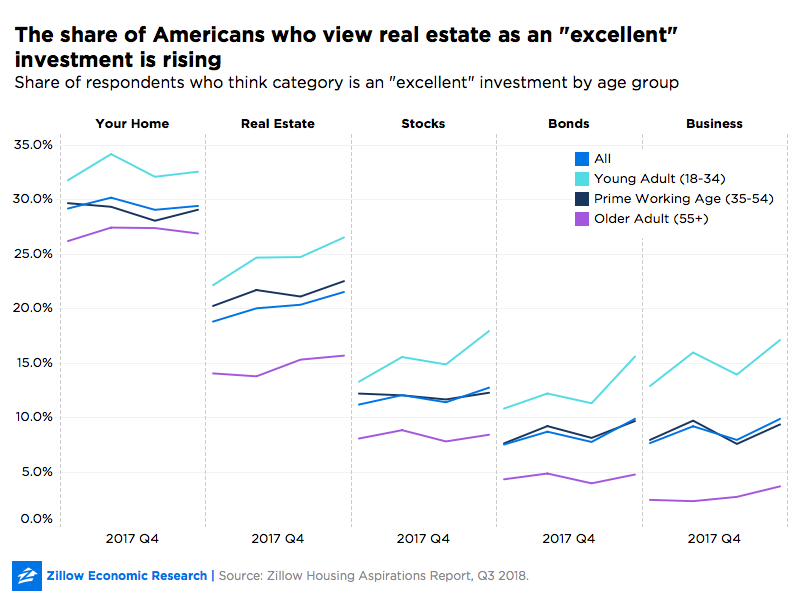America’s Youngest Adults Have the Most Confidence in Real Estate
Survey data collected over the past two years shows the nation’s youngest residents are also the most bullish on real estate.

Survey data collected over the past two years shows the nation’s youngest residents are also the most bullish on real estate.

There has been some speculation that young Americans, scarred by the 2008 financial crisis that marked their most-formative years, would be more skeptical of investments in real estate than their older peers. But survey data collected over the past two years as part of the Zillow Housing Aspirations Report (ZHAR) largely show the opposite – the nation’s youngest are also the most bullish on real estate.
Americans of all ages view their homes, and real estate more broadly, as good investments – particularly in comparison to stocks, bonds and businesses. But younger adults are even more optimistic about the investment potential of their homes and real estate than older adults.
As of Q3 2018, 29 percent of all Americans said buying a home was an “excellent” investment. Among young adults aged 18-34, 33 percent said it was an excellent investment, compared to 29 percent of prime working-age adults (35-54) and 27 percent of older adults aged 55-and-over. Similarly, 27 percent of young adults, 23 percent of prime working-age adults and 16 percent of older adults said that real estate in general (e.g., investment or commercial properties) is an “excellent” investment.
Over the past two years, the share of Americans who view buying a home as an “excellent” investment has been stable. But the share who view real estate overall as an “excellent” investment has been steadily on the rise, propelled upward largely by sentiment among younger adults. More than a quarter of young adults (27 percent) said they view real estate as an “excellent” investment, up from 22 percent in Q1 2017. Young-adult sentiment regarding other investment categories – including stocks, bonds and businesses – has also been on the rise.
While older millennials did see the American economy implode during their formative years, they have also borne witness to a remarkable recovery in home values over the decade since. Separating older millennials[1] (those likely in the labor force at the time of the 2008 financial crisis) from younger millennials (those still in high school or college, or younger, in 2008), it is clear that much of the recent jump in optimism about real estate and other investments has been driven by the youngest adults. Though also up over the past two years, sentiment toward real estate investments has been somewhat more tempered among older millennials.
Respondents in markets that have experienced a stronger housing market rebound – places like Los Angeles, Miami, San Jose and Denver – are more optimistic about the investment potential of their homes. On the other side of the coin, respondents in markets that have had less-dramatic recoveries – including Chicago, Detroit, Philadelphia and St. Louis – are less optimistic. There are similar patterns when it comes to real estate investments more generally. Respondents in San Jose, Denver, Los Angeles, Dallas and Miami were most optimistic about real estate investments, while respondents in Chicago, St. Louis, Detroit and Philadelphia were least optimistic.
Over the past few months, the American market has begun to show early signs of slowing – which brings both opportunities and new challenges for would-be homeowners and recent home buyers. If the slowdown persists or deepens, the optimism of young Americans who have borne witness to both a historic drop and a historic recovery in home values will be put to the test.
[1] To create similarly-sized age bins, we extended the upper limit of the age bracket that traditionally defines Millennials for this part of the analysis.